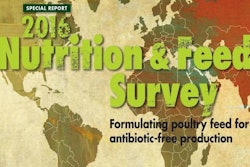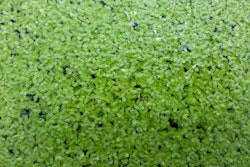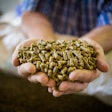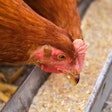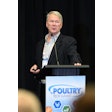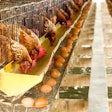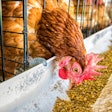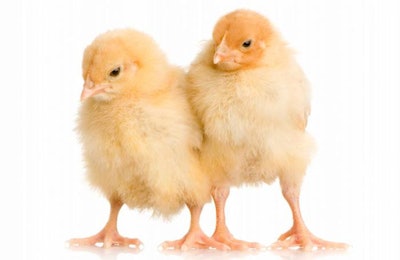
Every level of a farming operation needs to work together to address the flaws in animal agriculture exposed by the removal of growth-promoting antibiotics.
On June 16, Novus International gathered a panel of its experts at its St. Charles, Missouri, headquarters to discuss how the global agriculture industry is dealing with the steady removal of growth-promoting antibiotics from production. The group met as part of a press event celebrating the animal health and nutrition company’s 25th anniversary.
Dr. Mercedes Vazquez-Anon, senior director of animal nutrition and facilities at Novus; Dr. Nasser Odetallah, executive manager of global technical services at Novus; and Dr. Bob Buresh, executive manager of NORAM technical services at Novus, spoke about their experience working with clients adopting antibiotic-free practices.
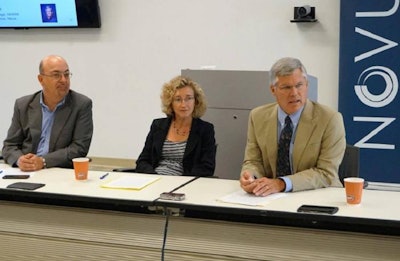
Dr. Nasser Odetallah, executive manager of global technical services at Novus; Dr. Mercedes Vazquez-Anon, senior director of animal nutrition and facilities at Novus; and Dr. Bob Buresh, executive manager of NORAM technical services at Novus, spoke about their experience working with clients adopting antibiotic-free practices on Thursday, June 16. | Austin Alonzo
“Antibiotics were helping us overcome some of the issues that we had – for example what we saw in ingredient quality, it allows us to use ingredients that maybe the digestibility needed to be improved – the way the antibiotic was working was hiding that problem,” Vazquez-Anon said. “By removing antibiotics we have to be more precise and do things better.”
Exposing issues
The panelists said removing growth promoting antibiotics has, and will continue to, resurrect problems previously solved by antibiotic feed additives. As the European Union banned growth promoting antibiotic use since 2006 and the United States prepares to roll out its own ban of some antibiotics, Novus noted issues masked by the additives are appearing in all phases of animal agriculture.
Buresh said the movement is creating issues for producers working in different parts of the world and is even creating different challenges for departments within the same company. Generally, ABF is spurring challenges in animal health, management and nutrition.
“It’s going to require (farmers) to evaluate their practices. They’re not going to be able to do things the way they always have,” Buresh said. “They are going to have to remain flexible and open to alternatives that five years ago they just thought were unnecessary.”
For management, farmers need to examine, and may need to change, every aspect of how they manage their animals. This means looking at the nursery, where producers may see the largest impact, to see how young animals with developing immune systems are being protected from diseases. It means looking at stocking density, and possibly housing fewer animals in the same amount of space. For poultry especially, it means investigating the amount of downtime necessary and closely monitoring litter quality to protect flocks from disease. Some of these things are simple part of good management, he said, but removing antibiotics put good management back into the spotlight.
From an animal health standpoint, removing antibiotics will create more issues with common diseases like coccidiosis and necrotic enteritis which are typically addressed by antibiotics. Now, effective vaccination for these disease – and other common illnesses – is going to come into focus. He said producers will continue to inundate by companies selling alternatives to antibiotics designed to solve these health problems – Novus included – but a mix of good products and good management, rather than a single product, will likely be needed.
As for nutrition, removing antibiotics is requiring producers and companies like Novus to reconsider feeding practices and what ingredients are going into feed. Everything, from the supplier to the ingredient quality to the nutritional content, will need to be scrutinized. Even the amount of food given to animals may need to change.
Vazquez-Anon said using antibiotics allowed animal agriculture to ignore some issues with poor quality ingredients going into animal feed. Without those tools, a range of gut health problems, including potentially higher mortality caused by necrotic enteritis, are challenging the industry.
That requires Novus and the industry to look into digestibility of feed ingredients and which compounds can be added to feed to help improve digestibility and maintain a healthy gut for maximum productivity. Specifically, the company is looking at the role enzymes play in digestion and maintaining a healthy microflora. It is also looking into the role nutrition plays in maintaining a strong immune system and how it can communicate that information to producers facing different challenges around the world.
Working together
Perhaps the largest issue exposed by widespread reduction and removal of antibiotic usage in animal agriculture is the lack of communication and need for better cooperation among wings of the same company.
The panelists said there are silos inside operations where people simply don’t communicate effectively, or simply don’t like working with people outside of their department in the organization.
“If we don’t all talk together, the nutritionists, the veterinarians and the management people, it’s going to be very difficult to provide the solution,” Odetallah said. “We have to sit together to understand the issues in commercial production. It requires more focus from everybody and it requires all of us to work really closely.”
To address the issues created by removing antibiotics, people inside agriculture and animal nutrition will need to put aside their habits and biases toward only working with a certain group of people and embrace working with people who are in a position to help solve the problem. To create the multidisciplinary solution needed, everyone, including members of the feed supply chain, farm managers, and breeders, deserve a seat at the table.
If the entire operation is being examined and overhauled, input must be collected from representatives of every part. Without it, creating an environment where animals can be healthy and just as productive as they were with growth promoting antibiotics, will be difficult.



